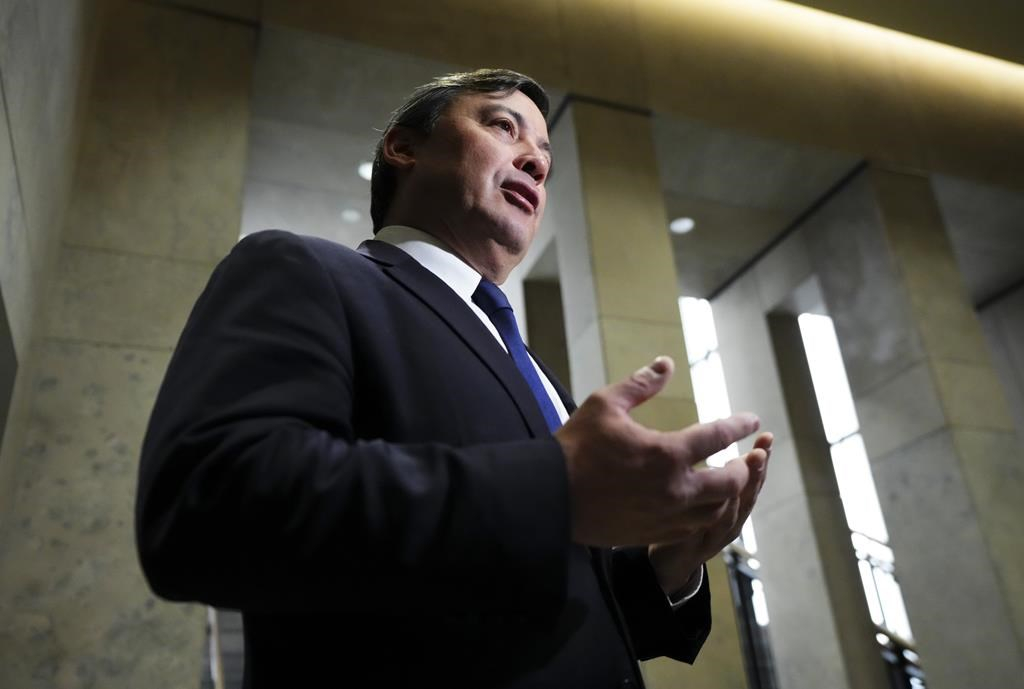Support strong Canadian climate journalism for 2025
The House of Commons has unanimously asked a parliamentary committee to look into allegations that the Chinese government waged an intimidation campaign against Conservative member of Parliament Michael Chong.
MPs voted Wednesday in favour of a motion brought forward by the Conservatives to have the House procedural committee study whether Chong's parliamentary privilege was violated by a foreign state.
Canada expelled a Chinese diplomat this week over a newly surfaced 2021 report by the Canadian Security Intelligence Service, which alleged that a Toronto consular officer sought to intimidate Chong and his relatives in Hong Kong because of the MP's criticism of China's human-rights record.
China responded by expelling a Canadian diplomat from Shanghai, and insists it has not targeted any MPs.
Foreign Affairs Minister Mélanie Joly warned ahead of the expulsion that Beijing could do more than just send envoys packing.
"Economic interests, consular interests and also diplomatic interests will be affected," she said last week. That has left industries bracing for blowback.
University of British Columbia professor Vina Nadjibulla said that's because while many countries tend to stick with reciprocal measures, China often responds months later in ways that are unrelated.
"If this had happened with any other country, the response would likely be the same," said Nadjibulla, who specializes in Indo-Pacific diplomacy.
She is watching to see whether Beijing blocks certain exports under the guise of regulatory issues, and said she isn't sure whether Canadians are more likely to be detained in China.
Nadjibulla noted that while Washington's travel advisory for China urges Americans to "reconsider travel … due to wrongful detentions," Ottawa only advises "a high degree of caution in China, due to the risk of arbitrary enforcement of local laws."
She stressed that China might choose not to escalate, and that COVID-19 travel barriers and diplomatic rows have made it even harder to understand a government that is often perplexing.
China is currently on "a diplomatic charm offensive" meeting with world leaders, she added, and might not want to be seen as a disruptive power.
There are also few examples of countries deeming Chinese diplomats as "persona non grata," with Washington and London opting to informally ask China to bring back diplomats.
"This was the right and necessary step for Canada to take," she said. "Regardless of this flare-up in tensions, our focus should be on our broader China strategy … and derisking our trade relations and deterring China's interference at home."
Margaret McCuaig-Johnston, a China expert at the University of Ottawa, says the government should assume that Beijing is taking a tit-for-tat approach and will only escalate things further if Canada does.
She took note of the Tuesday statement from China's Foreign Ministry spokesman Wang Wenbin that announced the expulsion of Canadian diplomat Jennifer Lalonde.
"We urge Canada to stop its provocation at once. If Canada decides to continue its wanton act, China will react firmly and all consequences arising therefrom must be borne by Canada," Wang is quoted saying in the official English translation of his remarks.
McCuaig-Johnston said Ottawa should latch on to that interpretation rather than stoking fears about a hit to Canada's economy or danger for its citizens in China.
"My interpretation suggests that it would be additional action on Canada's part that might be cause for further retaliation, rather than them planning to do anything further as a result of Mr. Zhao being sent home,” she said.
"It also is a threat. If we do few future things, there would be other retaliation."
McCuaig-Johnston argued Canada should treat China with the same amount of deference as any other country, and be clear-minded that Beijing is not afraid of inflicting economic pain.
"We certainly accept that Canada and China will always have a fairly comprehensive amount of trade going in both directions, because we they need our resources and we need their products," she said.
"Beyond that, they don't want to have much to do with Canada."
NDP foreign-affairs critic Heather McPherson said she hopes the committee will hear from intelligence experts as well as diaspora groups who feel targeted by foreign governments.
"They should be hearing from impacted communities in Canada," she said.
"It's very important that we're cautious and that we're thoughtful about how we do this so that national security is not put at risk but that we are getting the answers that we need."
Chong declined an interview request Wednesday as questions arose surrounding his recent briefing with the prime minister's national security adviser, Jody Thomas.
The Ontario MP said in Parliament that Thomas told him CSIS informed her predecessor in 2021 about the matter, yet it’s unclear who that was, as the role was held by different people at different times that year.
Three people who held the role have told media they don't recall seeing the document in question or did not hold that position when CSIS raised the issue.
In any case, Nadjibulla and McCuaig-Johnston say Canada will need to calibrate its approach to China through a series of developments.
Prime Minister Justin Trudeau’s special rapporteur David Johnston is due to report by May 23 with any "interim recommendations on the advisability of additional mechanisms or transparent processes" to help weed out foreign interference in Canada.
He will release a full report by October. McCuaig-Johnston said she expects the Liberals will call a public inquiry after that, given how much pressure they're already facing.
"These issues are not going to fade from attention. If anything, they're going to become more focused," she said.
This report by The Canadian Press was first published May 10, 2023.




Comments